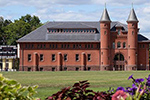Wesleyan Makes Efforts to Hire Underrepresented Employees

Wesleyan is making determined efforts to hire individuals from historically underrepresented groups, which have resulted in significant advances lately.
In 2017, 45 percent of staff hired (not including faculty) were of color — a dramatic increase from 26.4 percent the year before and the previous five-year high of 30.6 percent in 2014. Overall, 22.8 percent of staff identify themselves as of color.
Julia Hicks, chief human resources officer, points out that increasing diversity in the workplace has been shown to improve organizational performance. Diversity fosters inclusive cultures where individual differences are respected, teamwork is promoted, and intercultural competence and respect increase.
“We’ve made progress in part by changing our internal approach,” she says. “When hiring, we don’t take the easy way out. We partner with hiring managers to slow down their searches, to think harder about the pool than they might have in the past, to probe more and consider if candidates whose skills aren’t an exact match might be able to transfer those skills successfully to a different environment.”
When a hiring pool does not represent enough diversity, Human Resources has been pursuing direct recruiting by reaching out to people who haven’t applied to recruit them or get additional suggestions for candidates. This kind of effort, Hicks notes, may take additional time in the recruiting process but can add significantly to diversity in hiring.
Anjali Tamhankar, associate director of Human Resources, stresses the importance of cooperative effort and the climate at Wesleyan. “We work closely with the Office for Equity and Inclusion on promoting our diversity work. The commitment to creating a diverse workforce and an inclusive workplace starts with the President and his Cabinet, and extends throughout the university,” she says, adding: “That support makes this work possible.”
On the faculty side, Academic Affairs and the Office for Equity and Inclusion have collaborated to assure the development of diverse pools. In the last five years, Wesleyan has hired 69 faculty for potentially permanent positions, and of those, 49 percent were faculty of color, and 52 percent were women.
“Creation of diverse pools of candidates for all faculty searches is a priority, and Academic Affairs is committed to working with departments to achieve this important goal,” says Joyce Jacobsen, provost and vice president for academic affairs.
The faculty and academic deans take a hands-on approach to recruiting and retaining historically underrepresented faculty, often in competition with large research universities. All faculty search committee members receive training in ways to develop a diverse pool and recruit candidates. Candidates are asked to describe how they operate in diverse educational environments, notes Antonio Farias, vice president for equity and inclusion and Title IX officer.
“We care deeply about how faculty are able to engage with difference in the pursuit of intellectual growth, and any faculty member coming here should know that the inclusive classroom is vital,” Farias said in a recent interview with Wesleyan magazine.

